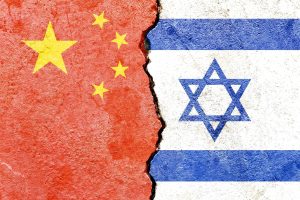When I spent a year in Israel in 2010-2011 as a visiting scholar, I clearly felt Israel’s desire to deepen relations with China. Relations between the two countries were also going smoothly at that time.
Regrettably, those positive feelings have all but evaporated today.
As early as 2021, I began to be very worried about the relationship between the two countries. So far, the reality of China-Israel relations continues to confirm my judgment. There is no doubt that the October 7 attack has become a new starting point for bilateral relations, by worsening the existing negative trend.
Hamas’ killing and kidnapping of civilians in Israel should certainly be condemned, as I have stressed several times in interviews and articles. In that regard, the initial response from the Chinese Ministry of Foreign Affairs on October 8 was questionable. Beijing subsequently condemned the October 7 attack, but damage had already been done.
The October 7 attack certainly had a profound impact on Israelis and Jews around the world. The anger of Israelis is clear: anger at Hamas, anger at Israeli politics, and anger at the international community that broadly supports Palestine. For Israel, October 7 is certainly a day that must be remembered.
That said, the objective reality before and after October 7 cannot be denied.
Initially, the international community generally sympathized with Israel, including many Chinese. But since then, Israel has been subject to more and more criticism from the international community – and this cannot be dismissed simply as “antisemitism” and “sympathy for the weak.” Global public opinion – including in China – recognizes that Israel does still occupy Palestinian land, and the ongoing war has undeniably resulted in the death of a large number of Gaza civilians. To change its global image, Israel also needs to rethink its policies toward the ongoing war and Palestinians.
Certainly, Hamas’s attack on civilians on October 7 should be condemned. But condemning Hamas is not inconsistent with supporting Palestinian demands in accordance with international law.
Unfortunately, the October 7 attack further intensified a growing rift between China and Israel. As noted above, Israelis were outraged at China’s initial hesitancy to condemn the Hamas attack. Those negative perceptions were confirmed by later statements from Beijing.
For example, after Israel attacked the consular department of the Iranian Embassy in Syria on April 1, China clearly condemned that attack. After Israel suffered a relatively large-scale retaliatory attack by Iran on April 14, however, China did not condemn Tehran. At the end of April, China invited Hamas, which is fighting Israel, to visit Beijing.
It is worth noting that on Chinese social media Weibo, almost every post of the Israeli Embassy in Beijing in recent months has received overwhelming negative comments or attacks from Chinese netizens.
Since the October 7 attack, voices blaming China are also not uncommon in Israel. At a time when Israel’s dissatisfaction with China is increasing, interactions between Taipei and Israel are heating up. The day after the October 7 attack, Taiwanese leader Tsai Ing-wen expressed her deepest condolences to all those who had been injured or lost loved ones in Hamas’ attack on Israel and Israeli civilians. She spoke against any form of terrorism and condemned attacks on civilians.
The Israeli media i24NEWS reported on October 23 that the “Taiwan Embassy donate[d] $70,000 to Israeli soldiers and families.” On October 26, Maya Yaron, “Israel’s envoy in Taipei,” said that “Taiwan is really a good friend for Israel and we truly appreciate everything that we receive.”
The Israeli newspaper Haaretz bluntly stated on December 14: “As China Sides With Palestinians, Gaza War Could Strengthen Israeli Ties With Taiwan.” So far it seems that Haaretz’s judgment is correct. Taipei condemned Iran’s direct attack on Israeli soil. On April 15, Tsai met with a visiting cross-party delegation from the Israeli Knesset.
On the one hand, Israel’s political dealings with Taiwan anger Beijing. On the other hand, China’s support for the Palestinians and Iran angers Israel. It is obvious that China-Israel relations have fallen into a vicious cycle.
There is no doubt that both China and Israel can exist without each other, but this is the worst outcome for both countries. I believe that neither Chinese nor Israeli policymakers will make this choice. On the other hand, it is unrealistic to think that relations between the two countries can reverse course and recover in a short period of time. China-Israel relations will operate at a low level for quite some time.

































